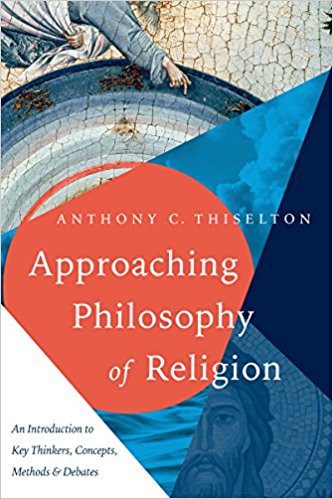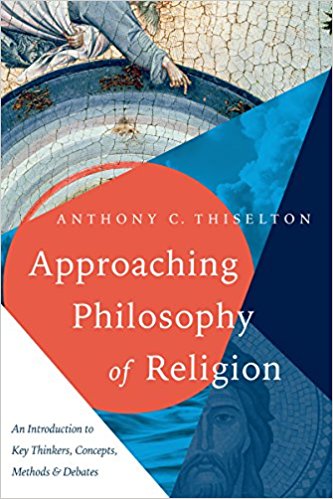Approaching Philosophy of Religion: An Introduction to Key Thinkers, Concepts, Methods and Debates

A Denver Journal Book Review by Denver Seminary Alumnus Hutton C. Sharp

Anthony C. Thiselton, Approaching Philosophy of Religion: An Introduction to Key Thinkers, Concepts, Methods & Debates. Downers Grove, IL: InterVarsity Press, 2018. $24.00, paperback. 224 pages with index. ISBN 978-0-8308-5206-2.
Anthony C. Thiselton is emeritus professor of Christian theology at the University of Nottingham, England. His distinguished career as a theologian and philosopher is made manifest by the fact that he has published nearly thirty books in these fields. Approaching Philosophy of Religion is Thiselton’s newest work: a constructive attempt to introduce the basic historical, conceptual, and methodological issues pertaining to the philosophy of religion. As an introduction to this field, Thiselton’s brief work provides the reader with an accessible treatment of the related issues and subsequently points beyond itself, in the hope that the reader will continue his or her study by engaging some of the more advanced works listed in its select bibliography. Thiselton seeks to remain as neutral as possible due to the nature of his work, and he is largely successful in that regard. The work is divided into four sections: an introduction, and three parts.
The Introduction provides the reader with a brief history of the most important thinkers and landmarks in the philosophy of religion. Thiselton treats the ancient, the medieval, and the early modern eras, and then discusses the period of time from Hegel to the present day. This overview serves as a brilliant history lesson and also frames the entire discussion of the nature of philosophy of religion. Of contemporary import in this section is Thiselton’s presentation of the relationship between faith, reason, and knowledge. Thiselton draws on Aquinas, Anselm, Pascal, Locke, and Kant, among others, demonstrating how each understood the role of reason and faith in coming to knowledge.
In Part 1, Thiselton provides the reader with an overview of the basic approaches in philosophy of religion. A variety of approaches are listed in alphabetical order in order to reduce any supposed biases. Approaches include analytic philosophy, empiricism and rationalism, feminist philosophy, and pragmatism. Each section includes a basic history of the approach, as well as its most important thinkers and ideas. Thiselton, drawing on his experience as professor of Christian theology at the University of Nottingham, demonstrates a vast knowledge of the content of the various approaches as well as of the literature produced by those philosophers who approach philosophy of religion in those ways.
Part 2 contains a discussion of a variety of the most pertinent concepts and issues in contemporary philosophy of religion. Again, the concepts and issues are listed in alphabetical order so as to reduce any alleged bias. Of note in this section is Thiselton’s discussion of the attributes of God, in which he considers the historical and conceptual value of the term attribute in describing who God is and what God does. Historically, “it was a term regularly used of God in the systematic theologies of the later nineteenth century” (p. 115), but many contemporary theologians and philosophers shy away from the term for a variety of reasons, including that “there are lingering suspicions that ‘attribute’ suggests being rather than action, and static substance rather than purposive actions” (p. 116).
In Part 3, Thiselton lists and defines the key terms in philosophy of religion, again in alphabetical order. Each term receives a definition and a note on its history in philosophical thought, though the definition and notes are quite brief indeed. Of note in this section is Thiselton’s definition of theology which “strictly denotes discourse about God” (p. 194). He continues by saying that “in the Christian tradition the theologies of Augustine, Aquinas, and the Reformers, and in the modern era Barth, Balthasar, Tillich and Pannenburg (among others), deserve special note” (p. 194). Thiselton also discusses three prominent theories of the nature of truth in this section: correspondence theory, coherence theory, and pragmatic theory. Correspondence theory is the idea that truth is that which corresponds to reality. Coherence theory stresses the idea that “something is true only if it holds together with all other true propositions within a system of belief or knowledge” (p. 195). Pragmatic theory holds that “truth emerges only if something works successfully” (p. 195). Since his work is merely an introduction, Thiselton summarizes the discussion by saying, “all three theories have strengths, but all raise problems and have disadvantages” (p. 195).
One of the deficiencies of Thiselton’s work is due primarily to the nature of the work he is presenting. Because philosophy of religion is so broad, and because Thiselton’s work is a brief introduction to the topic, certain discussions and terms in his work received somewhat fleeting attention. One wishes, for example, that Thiselton would have provided a more extended discussion of the related doctrines of immutability and impassibility. Yet only a passing definition and a brief comment about the current state of the doctrines in contemporary philosophical theology are provided. Even with the knowledge that Approaching Philosophy of Religion is only an introductory work, it is slightly disappointing to see such important doctrines as these passed over with relative ease.
Approaching Philosophy of Religion is both an interesting and compelling work which seeks to introduce the basic historical, conceptual, and methodological issues in the philosophy of religion. Thiselton’s efforts have produced a work which should be commended as an introduction to this vast subject area. The deficiencies of the work are more logistical than substantial, meaning that due to the size of the work and its function as a brief introduction to the field, certain topics do not receive the attention they warrant or deserve. Yet the treatment which Thiselton does provide to these topics does sufficient justice for an introductory work, and moreover he provides a select bibliography which contains works that discuss the relevant issues in greater detail. Nonetheless, any reader, whether they have an extensive knowledge of philosophy of religion or have never been introduced to any of the issues therein, will benefit from a thoughtful engagement of Thiselton’s work.
Hutton C. Sharp, MA
Denver Seminary
May 2018
